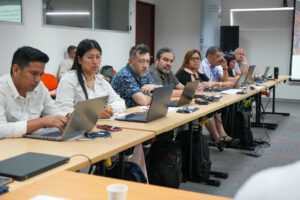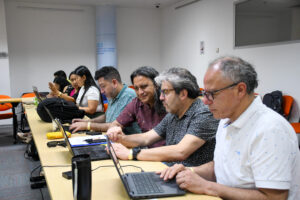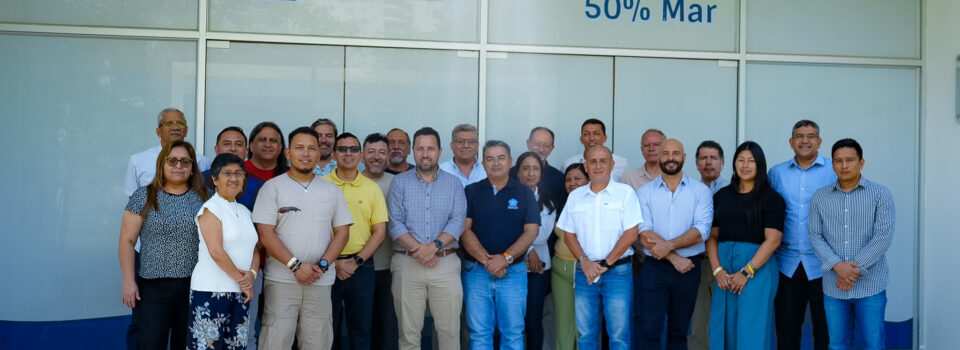IFOP researchers participate in FAO regional workshop to review the Analysis of the State of Fishery Stocks in Area 87
January 3rd, 2025 The FAO regional workshop to review the Analysis of the State of Fishery Stocks in Area 87 was held between November 25-29, 2024 in Santa Marta, Colombia. Dr. Carlos Montenegro S. Head of the Fisheries Research Division, MSc. Carlos Techeira T. Head (I) Department of Resource Assessment and Senior Researchers MSc. Mauricio Ibarra M. and Fernando Espíndola R. participated in this activity.
The FAO regional workshop to review the Analysis of the State of Fishery Stocks in Area 87 was held between November 25-29, 2024 in Santa Marta, Colombia. Dr. Carlos Montenegro S. Head of the Fisheries Research Division, MSc. Carlos Techeira T. Head (I) Department of Resource Assessment and Senior Researchers MSc. Mauricio Ibarra M. and Fernando Espíndola R. participated in this activity.
The objective of this workshop was to synthesize the estimates of the state of the stocks within the framework of a transparent and participatory assessment, considering the national fisheries research agencies of Chile, Peru, Ecuador and Colombia. It should be noted that these countries are those that correspond to Area 87.
Since 1971, FAO has published the analysis periodically, including updated summaries presented in the biennial FAO flagship report: “The State of World Fisheries and Aquaculture (SOFIA)”. Today, the fisheries sector is significantly different from that of the 1970s, the dominant stocks and the levels and modes of exploitation have changed, which led to the evolution of the tools and requirements for calculating and presenting information on global sustainability, including the need for transparency of the processes and the consideration of local knowledge.
 At the same time, parallel monitoring processes need to be connected and FAO considered it appropriate to implement a methodological update to estimate and report in a standard way the global state of stocks with broad participation of experts, maintaining the crucial integrity of the historical series.
At the same time, parallel monitoring processes need to be connected and FAO considered it appropriate to implement a methodological update to estimate and report in a standard way the global state of stocks with broad participation of experts, maintaining the crucial integrity of the historical series.
The objectives of the workshop were:
- To introduce FAO methods regarding stock status and reporting processes.
- To advance the development of national-level stock reference lists.
- To present and discuss proposed new approaches to classifying and reporting on stock status.
- To identify options to improve the collection, assessment and reporting of stock status data and information at the national level.
The agencies that participated in the activity were: FAO, Food and Agriculture Organization of the United Nations; IFOP, Institute for Fisheries Development, Chile; IMARPE, Institute of the Sea of Peru; INVEMAR, Institute for Marine and Coastal Research, Colombia; and MPCEIP, Ministry of Production, Foreign Trade, Investments and Fisheries, Ecuador.
FAO consultant Omar Defeo referred to the workshop in terms of “The activity carried out in Santa Marta was a scientifically solid, objective and highly participatory exercise, which resulted in the generation of invaluable material for FAO and the region (Area 87) regarding the state of fishery resources.”
“The rigorous analysis carried out by the countries in the categorization of stocks in Tiers, as well as in the evaluation of their state of exploitation, allowed for the first time the creation of a unique information base for Area 87. The number of stocks evaluated experienced a significant increase, expanding more than tenfold compared to the records previously considered by FAO for this area.”
Regarding IFOP’s contribution to the workshop, Dr. Defeo said: “The contribution of the IFOP team to the FAO fisheries workshop was highly significant and of great value for the objectives of the event. Their active and constant participation reflected a deep commitment to the issues addressed, standing out for their leading role in the discussions on the main topics developed during the meeting. This participatory approach not only strengthened the debates, but also promoted an enriching exchange of ideas and perspectives.”
“The team demonstrated excellence by presenting scientifically impeccable information, based on high-quality databases and extensive time series for each stock assessed. These data allowed the decisions taken at the workshop to be rigorously supported, providing a level of detail and reliability that was widely recognized by FAO.”
“The IFOP team also stood out for presenting information on the status of the stocks supported by high-quality numerical analysis and models, which were essential to justify the categorization of each stock into the corresponding Tiers. These technical and methodological contributions not only facilitated a clearer understanding of the dynamics of each resource, but also provided additional support for discussing management options discussed in the framework of the workshop. In summary, the IFOP team played a central role in the success of the workshop, providing solid knowledge, rigorous analysis and a constructive attitude that left a positive impression and a tangible impact on the deliberations and outcomes of the event.”
